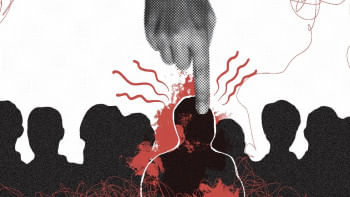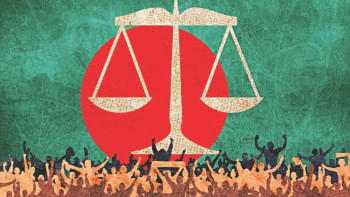What the Awami League and Jamaat can learn from apologies

Political discourse in Bangladesh is increasingly marred by a dangerous trend, especially through the casual use of stigmatising labels against ideological dissent. The trend of tagging individuals as pro- or anti-Islamist, pro-Pakistani or pro-Indian—often based on circumstantial or short-term politically opportunistic interpretations—is inevitably problematic and deeply destabilising. This culture of labelling undermines democratic norms and contributes to long-term sociopolitical volatility. What may begin as a strategic manoeuvre to delegitimise opponents often spirals into a broader culture of suspicion, hostility, and somatic violence. The effects of this tagging culture have eroded democratic values and compromised national security.
A recent example is Mahfuj Alam, the current adviser for information and broadcasting in the interim government. Over time, he has faced various political labels, including accusations of being an Islamist linked to the banned group Hizb-ut Tahrir and a pro-Pakistan sympathiser. More recently, he has been accused of being both pro-Indian and anti-Islamist, based on a Facebook post and a critical speech about the student-teacher protests at Jagannath University. These contradictory labels highlight the opportunistic and inconsistent nature of political branding in Bangladesh. As he appeared to address JnU protesters, Mahfuj was physically attacked with a water bottle and later targeted with widespread verbal abuse. Yet, instead of retaliating, he invited his attacker to his home for tea, which is a rare and commendable gesture in a political culture often driven by vengeance. His response mirrors two other recent public apologies that stand out in Bangladesh's deeply polarised political landscape.
The first came from the Islamist group Hefazat-e-Islam, following outrage over misogynistic censures made by some of its leaders during a protest at Suhrawardy Udyan against the proposals of Women's Affairs Reform Commission. Under public and legal pressure, the party issued a formal official apology—an unprecedented move in its history. This is particularly significant given that in 2013, Hefazat's then chief Shah Ahmad Shafi derogatorily compared women to tamarinds, which credited him with the satirical title "Tamarind Hujur." Despite national uproar, neither he nor the party apologised for this derogation.
Another significant example from the Bangladeshi media landscape occurred during the 2006-2008 caretaker government period, when nearly all media outlets were accused of uncritically reproducing narratives and stories provided—often pushed—by intelligence agencies, particularly the DGFI. Only the New Age resisted this trend, and years later, a prominent editor acknowledged this by crediting the New Age and publicly apologising on a television show for his own paper's role during that period. Such rare apologetic humility in our culture marked a significant milestone for media accountability and journalistic ethics in Bangladesh.
These three acts of forgiveness and apology carry significant weight at a time when public figures rarely admit their wrongdoings. In a regressive political culture so often driven by aggression and propaganda, these gestures suggest a potential shift towards democratic values and an ethic of accountability.
Our nation is still haunted by the legacies of the 1971 Liberation War and deeply divided over many issues. Most importantly, targeted and opportunistic tagging of political opponents often imperils hard-won democratic gains. Such practices silence dissent and deepen societal divisions. In this context, three key lessons emerge from these events that merit broader reflection in Bangladesh's socio-political landscape.
One editor's public apology underscores that admitting mistakes reflects ethical responsibility, not weakness—an essential trait for media credibility. Hefazat-e-Islam's rare apology shows that even rigid groups can practise humility, setting a precedent for other conservative actors. Meanwhile, Mahfuj Alam's choice to forgive his attacker—despite legal grounds for punishment under the Penal Code which ensures punishment for such an assault can be up to three months' imprisonment, a fine of up to Tk 500, or both—exemplifies compassionate leadership and a break from the politics of vengeance.
Towards genuine democratic renewal
To achieve genuine democratic renewal, Bangladesh must adopt a political culture rooted in historical truth and moral accountability. This demands that all political actors, especially Jamaat-e-Islami, confront past wrongdoings—most notably its controversial role during the 1971 Liberation War. The party's internal divisions highlight the urgency of such reckoning. Barrister Abdur Razzaq, Jamaat's former assistant secretary general, resigned after failing to convince party leaders to seek an apology. Razzaq's stance was a principled act that sparked introspection within the party, reflected in the public tribute paid by Jamaat activists at his funeral. Jamaat's continued failure to unequivocally support the Liberation War remains a profound moral and political shortcoming.
Similarly, the Awami League must confront recent allegations of state-sponsored atrocities. A leaked audio recording allegedly implicates the then regime premier Sheikh Hasina in authorising the use of lethal force against demonstrators. In addition, a recent UN fact-finding report describing state actions as potential crimes against humanity raises grave concerns about human rights and democratic governance in the country. It is worth mentioning that Sheikh Hasina sought apology for any mistakes committed by her father's Awami League government during its 1972-75 tenure, which allegedly brought her to power through an electoral victory.
Given these realities, both Jamaat-e-Islami and the Awami League must formally acknowledge their past misdeeds. Only sincere apologies and concrete steps towards accountability can help the country build a political culture based on democratic values, mutual respect, and a more equitable society.
Dr Sazzad Siddiqui is associate professor and acting chairman of the Department of Peace and Conflict Studies at the University of Dhaka.
Views expressed in this article are the author's own.
Follow The Daily Star Opinion on Facebook for the latest opinions, commentaries and analyses by experts and professionals. To contribute your article or letter to The Daily Star Opinion, see our guidelines for submission.


 For all latest news, follow The Daily Star's Google News channel.
For all latest news, follow The Daily Star's Google News channel. 




Comments